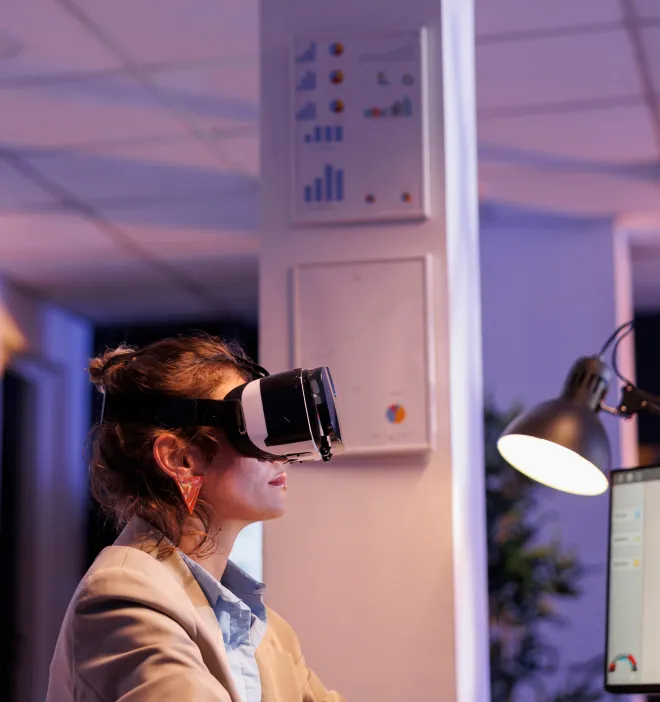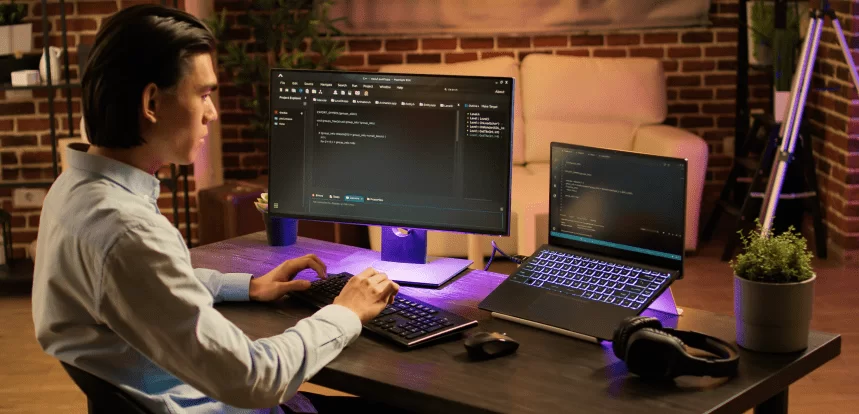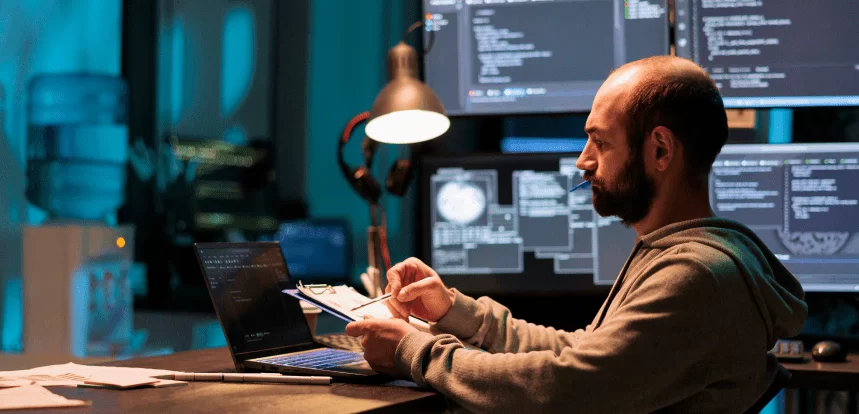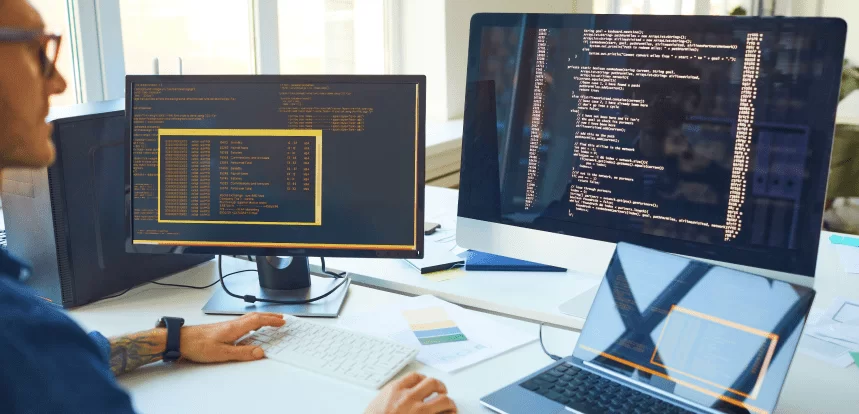We develop custom image and video analysis software for advanced computer vision systems. Our solutions handle face analysis, gesture recognition, and image classification to enhance machine vision capabilities.
Get free consultation and let us know your project idea to turn it into an amazing digital product.

Our computer vision software developers have a wide range of expertise in various areas of computer vision. They have extensive experience working with complex algorithms, frameworks, and technologies such as OpenCV, TensorFlow, and PyTorch, enabling them to develop highly performant and reliable computer vision applications.

It can examine every pixel in an image to identify pertinent details, much like a human. Our AI-powered cameras can perform object detection, image classification, facial recognition, OCR, pattern recognition, motion detection, and image segmentation.
Our team specializes in video analytics, which involves meticulously examining digital images and videos. This process enables us to perform diverse tasks, such as counting the number of individuals in a video or identifying specific objects and individuals within it.
We identify and track objects within images and videos and label them with relevant information with methods like object detection, object tracking, and object labeling.
Chatbots can collect valuable customer data, such as preferences and purchase history, providing businesses with insights for marketing and sales strategies.
We can assign one or more relevant labels to raw data, such as images, text files, and videos, to provide additional context, enabling machine learning models to learn from the data and to make accurate predictions or classifications.
We extract text from images with Optical Character Recognition (OCR) and Intelligent Character Recognition (ICR), thereby eliminating the need for manual data input.
We annotate images with descriptive labels or tags to improve machine-learning model accuracy through object recognition, image segmentation, and bounding box labeling.
With GAN, we can generate new data instances that closely resemble existing data, e.g. we can create images that resemble photographs of human faces, even though the faces depicted may not belong to any actual person.
With CBIR, we can search and retrieve images from a database. We input a query image and are presented with a selection of images from the database that share similarities with the query image. The system achieves this by analyzing the database to find the most similar ones.
We detect and recognize human emotions from visual cues, such as facial expressions, body language, and tone of voice. This helps us understand better and respond to human emotions in various applications, such as marketing, healthcare, and entertainment.
We Are India’s
At our computer vision company in India, we empower businesses worldwide to achieve scalability, transformation, and a competitive edge through our innovative solutions.
Our extensive knowledge in various business domains, proven methodologies, and technical expertise enable us to deliver high-quality solutions that bring significant value to businesses. As a top-tier custom computer vision development company, we prioritize our client’s needs and work with a client-centric approach.
From startups to big enterprises, development
From startups to big enterprises, development
From startups to big enterprises, development
From startups to big enterprises, development
From startups to big enterprises, development
From startups to big enterprises, development
From startups to big enterprises, development
Drop us a line and we'll get back to you immediately to schedule a call and discuss your needs personally.


Computer Vision Software Development is a technology field where we teach computers to understand and make sense of the visual world as humans do with their eyes and brains. This technology enables computers to ‘see’ and interpret images and videos, a critical part of artificial intelligence (AI). Computer vision allows machines to identify objects, track movements, and even recognize faces, opening up exciting possibilities for various industries and applications.
Computer vision comes in several types, each serving specific purposes:
Object Detection: This computer vision helps computers locate and recognize objects within images or videos. It’s commonly used in security systems and autonomous vehicles to identify obstacles.
Image Classification: Image classification categorizes images into predefined groups or labels. It’s used in applications like sorting images, identifying objects in photos, and classifying diseases from medical images.
Facial Recognition: Facial recognition technology identifies and verifies individuals by analyzing their facial features. It’s widely used in security systems, access control, and unlocking smartphones.
Optical Character Recognition (OCR): OCR extracts text from images or scanned documents, making digitizing printed or handwritten text possible. It’s used in document scanning and data entry.
Gesture Recognition: Gesture recognition enables computers to understand human gestures, such as hand movements or gestures on touchscreens. It’s used in gaming, virtual reality, and controlling smart devices.
3D Computer Vision: This branch of computer vision creates three-dimensional models from two-dimensional images or videos. It’s essential in fields like robotics and augmented reality.
Motion Analysis: Motion analysis focuses on tracking and understanding movements and actions in videos. It’s used in sports analysis, surveillance systems, and animation.

Computer vision offers numerous advantages:
Automation: Computer vision can automate repetitive tasks by allowing machines to ‘see’ and make decisions based on visual information. For example, it’s used in quality control on manufacturing lines to identify product defects.
Enhanced Security: It plays a crucial role in security systems by recognizing faces, identifying suspicious activities, and monitoring areas in real-time.
Improved Healthcare: In the medical field, computer vision can analyze medical images like X-rays and MRIs to assist doctors in diagnosing diseases accurately.
Retail Efficiency: In retail, computer vision powers visual search engines, cashier-less stores, and inventory management systems. It enhances the shopping experience and optimizes inventory levels.
Autonomous Vehicles: Self-driving cars use computer vision to ‘see’ and understand the road environment. This technology is vital for ensuring the safety and functionality of autonomous vehicles.
Popular software and libraries for computer vision development include:
OpenCV: OpenCV is an open-source computer vision library that provides various tools and functions for image and video analysis. It’s widely used for its versatility and community support.
TensorFlow: TensorFlow is a popular machine learning framework with modules for computer vision tasks. It’s known for its flexibility and scalability, making it suitable for complex projects.
PyTorch: PyTorch is another deep-learning library for image analysis and computer vision. It’s favored for its ease of use and dynamic computation capabilities.
Dlib: Dlib is a toolkit that offers machine learning and computer vision tools. It’s known for its facial recognition capabilities and is often used in face detection applications.
Scikit-image: Scikit-image is a Python library specifically designed for image processing. While not as comprehensive as other libraries, it’s straightforward and useful for basic image analysis tasks.
MATLAB: MATLAB provides various tools for image processing and computer vision applications. It’s widely used in academia and research.
These software tools and libraries empower developers to create computer vision solutions by providing pre-built functions and algorithms for image and video analysis. Developers choose the most suitable one based on project requirements and familiarity with the tools.

When integrating computer vision into projects, consider these best practices:
Data Quality: The accuracy of computer vision models heavily relies on the quality of the training data. Clean, diverse, and representative data is essential for achieving reliable results.
Testing: Rigorous testing and validation of computer vision models are crucial before deployment. Testing helps identify and correct errors and fine-tune the model for better performance.
Privacy: It’s vital to handle sensitive data responsibly when using computer vision, especially in facial recognition applications. Ensure compliance with privacy regulations and protect individuals’ privacy rights.
Scalability: Design computer vision systems with scalability in mind. As the amount of data grows, systems should be able to handle larger datasets and increasing processing demands.
Monitoring: Continuous monitoring and maintenance of computer vision models are necessary to ensure they perform at their best. Models should be periodically retrained and updated to adapt to changing conditions and data.
These best practices help ensure the successful integration of computer vision technology into various applications while maintaining accuracy, privacy, and reliability.
Computer vision has diverse applications:
Healthcare: Diagnosing diseases from medical images and monitoring patient conditions.
Retail: Visual search, cashier-less stores, inventory management.
Manufacturing: Quality control, defect detection, robot guidance.
Automotive: Autonomous driving, driver assistance systems.
Security: Facial recognition, object tracking in surveillance.
Agriculture: Crop monitoring, pest detection, yield prediction.

Developing computer vision software follows these steps:
Data Collection: Gather a large dataset of images or videos.
Data Preprocessing: Clean and prepare the data for training.
Model Selection: Choose a suitable computer vision model or algorithm.
Training: Train the model on the dataset using machine learning techniques.
Testing and Validation: Evaluate the model’s accuracy and adjust as needed.
Integration: Integrate the model into your application or system.
Deployment: Deploy the computer vision software for real-world use.
Monitoring and Maintenance: Continuously monitor and update the model for optimal performance and accuracy.
Here are a few of the most frequently asked questions about Chatbot development services:
Ans. ValueCoders has a team of experienced developers with expertise in computer vision technologies. We have a track record of successfully delivering custom computer vision solutions to clients across diverse industries. Our commitment to quality, security, and innovation sets us apart.
Ans. We leverage various technologies and tools for computer vision development, including deep learning frameworks like TensorFlow and PyTorch, OpenCV for computer vision libraries, and various programming languages like Python, C++, and more.
Ans. Our pricing for computer vision software development services varies depending on the project’s complexity, scope, and specific requirements. Please contact us for a customized quote based on your project needs.
Ans. Yes, we have experience working on projects of all sizes, from small proof-of-concept prototypes to large-scale, enterprise-level computer vision solutions. Our team can tailor our services to meet your project requirements.
Ans. We take data security and privacy seriously. We implement robust data protection measures, comply with relevant regulations, and ensure secure data handling throughout development.
Ans. Project timelines can vary based on project complexity and requirements. After assessing your specific needs, we provide project timelines during the initial consultation phase.
Ans. Yes, we offer post-launch support and maintenance services to ensure your computer vision software remains up-to-date, secure, and optimized for performance.
We are grateful for our clients’ trust in us, and we take great pride in delivering quality solutions that exceed their expectations. Here is what some of them have to say about us:
Trusted by Startups and Fortune 500 companies
We can handle projects of all complexities.
Startups to Fortune 500, we have worked with all.
Top 1% industry talent to ensure your digital success.



Let's discuss how we can bring your vision to life.